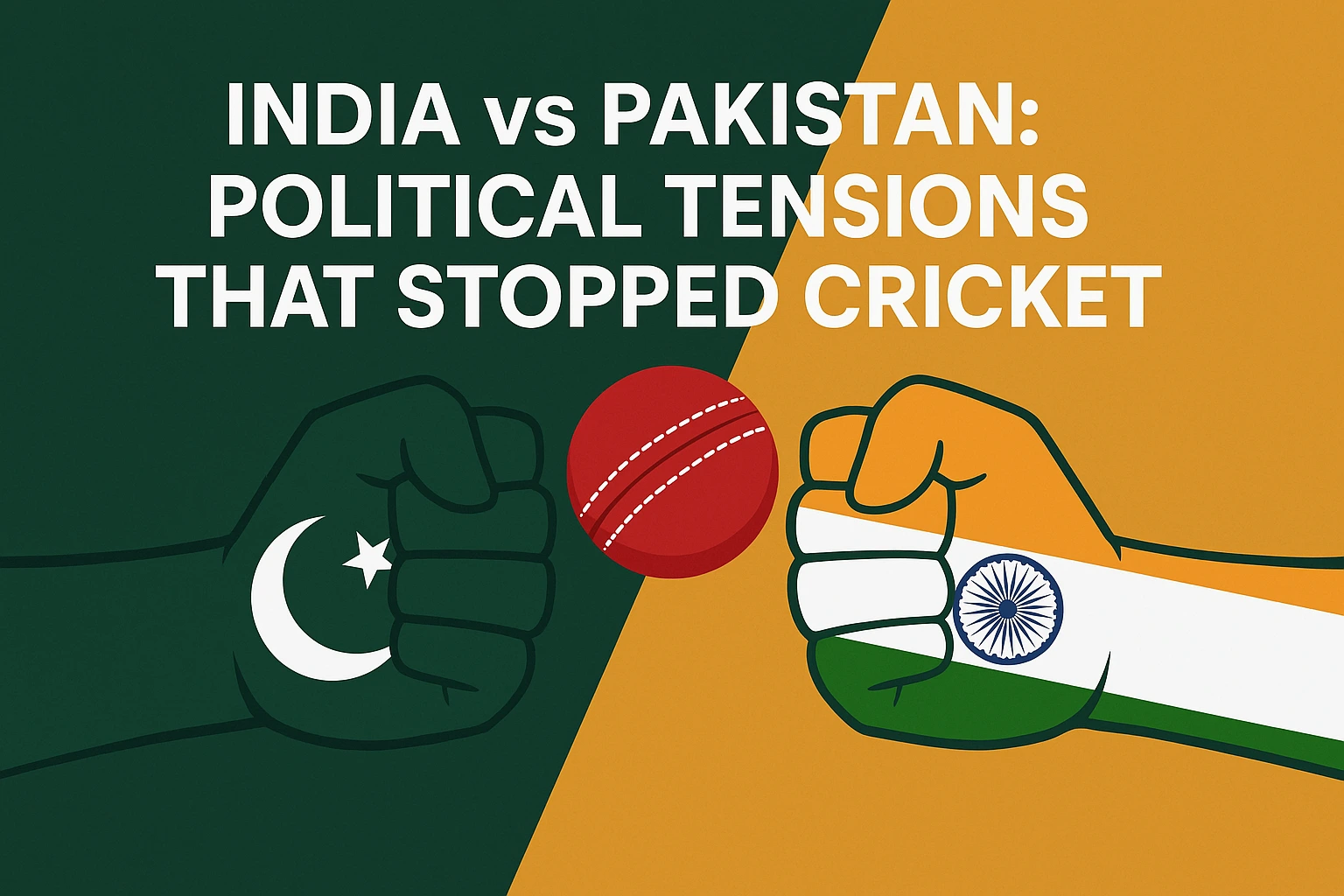In Pakistan and India, cricket is more than just a game; it’s a story about history, identity, and emotions. The fierce rivalry between these two nations goes beyond the boundary ropes, deeply intertwined with their complex political relations. This article examines how political tensions have repeatedly disrupted cricket matches between India and Pakistan and why cricket, despite its capacity to unite, often becomes a casualty of strained diplomatic relations.
Introduction
India and Pakistan share one of the most intense cricket rivalries in the world. Millions of people eagerly await the showdown between these squads. Yet, off the field, political tensions have often cast a shadow, causing interruptions in cricketing ties. Why does this happen, and what does it tell us about the relationship between these neighbours?
Historical Background of India-Pakistan Relations
The roots of India-Pakistan tensions trace back to the 1947 partition, which created two separate nations but left wounds that never fully healed. Several wars, including those in 1947, 1965, and 1971, further strained ties. These conflicts seep into various aspects of diplomacy, including sports, where cricket matches often reflect the broader political climate.
The Cricketing Bond: A Tale of Passion and Rivalry
Despite the hostility, cricket remains a shared passion. For decades, cricket served as one of the few bridges connecting the two peoples. From nail-biting Test matches to thrilling World Cup encounters, India-Pakistan matches have produced unforgettable moments, uniting fans in excitement even as their governments clashed.

Cricket as a Diplomatic Tool
There have been times when cricket was used deliberately to thaw political ice. The 1987 World Cup, hosted in India, and the 1996 tournament, co-hosted by both nations, saw goodwill gestures. Cricket diplomacy reached its peak in 2004 when former Indian Prime Minister Atal Bihari Vajpayee visited Pakistan, marking a brief period of peaceful exchanges marked by cricket tours.
Political Tensions Leading to Cricket Bans
Unfortunately, cricket often becomes collateral damage when political relations sour. Terrorist attacks, diplomatic crises, and cross-border skirmishes have led to a series of cancellations and bans on bilateral matches. When the political climate is tense, the safety of players and fans becomes a concern, and governments are hesitant to allow sporting events.
2008 Mumbai Attacks and Its Impact
The 2008 Mumbai terror attacks, which killed over 170 people, many of whom were Indian civilians, were a turning point. The attacks were linked to groups operating from Pakistan, which caused India to suspend all bilateral cricket ties. The vibrant cricketing exchanges of the previous years came to a sudden halt, disappointing millions of fans and straining diplomatic efforts.
The 2016 Uri Attack and Surgical Strikes
Tensions flared again in 2016 after an attack on an Indian army base in Uri, Jammu and Kashmir, allegedly by militants from Pakistan. India’s surgical strikes across the Line of Control led to heightened hostilities. In response, several scheduled cricket series were cancelled or postponed indefinitely, including Pakistan’s tour of India.
The Role of Governments and Cricket Boards
The Board of Control for Cricket in India (BCCI) and the Pakistan Play Board (PCB), the cricket bodies, are frequently torn between politics and play. While both boards may wish to promote cricketing ties, government pressure and national security concerns heavily influence decisions, leaving cricket vulnerable to diplomatic strains.
Attempts to Resume Cricketing Ties
Despite setbacks, there have been earnest attempts to restart cricketing relations. Matches at neutral venues, such as the UAE, have hosted India-Pakistan encounters during tournaments. These efforts often depend on the prevailing political atmosphere, which can change rapidly, affecting the scheduling of bilateral series.
2011 World Cup and 2017 Champions Trophy Encounters
In 2011 and 2017, India and Pakistan met in two of cricket’s most significant global events. These matches attracted enormous attention and enthusiasm, but they also demonstrated that cricket relationships can only endure in international competitions when direct bilateral connections are suspended.
The Present Scenario and Future of India-Pakistan Cricket
Currently, political relations remain fragile. Bilateral cricket tours are rare, with occasional clashes dominating headlines. The future of India-Pakistan cricket hinges on broader political breakthroughs. Meanwhile, cricket diplomacy remains a promising yet precarious concept.
Impact of Political Tensions on Players and Fans
Players on both sides face uncertainty, often missing chances to showcase their talents against their biggest rivals. Fans feel the sting of missed encounters that once brought communities together, highlighting how political decisions ripple beyond diplomacy into the heart of people’s passions.
Conclusion
Political tensions between India and Pakistan have repeatedly stopped cricket, turning the sport from a bridge into a battleground. Yet, cricket’s immense power to connect remains undeniable. As history shows, even amid political strife, the game offers hope for dialogue and peace. One can only hope that someday soon, cricket will return to its role as a unifying force for the millions who cherish it on both sides.
FAQs
1. Why does political tension stop India-Pakistan cricket matches?
Political tensions, especially those involving security concerns and cross-border conflicts, often lead to cancellations to ensure the safety of players and fans, as well as to mitigate diplomatic fallout.
2. Has cricket ever helped improve India-Pakistan relations?
Indeed, cricket has demonstrated its potential as a soft diplomatic instrument by reducing tensions on occasion, as seen in the peace process of the early 2000s.
3. What are some famous cricket matches between India and Pakistan?
Notable matches include the 1996 World Cup quarter-final, the 2007 T20 World Cup final, and the 2011 World Cup semi-final, each full of high drama and passion.
4. Is cricket diplomacy still viable in the face of intense political disputes?
While challenging, cricket diplomacy can serve as a confidence-building measure if there is political will, but it often depends on broader peace efforts.
5. When might India and Pakistan play bilateral cricket again?
It depends mainly on political developments and improved bilateral relations, which remain unpredictable at present.